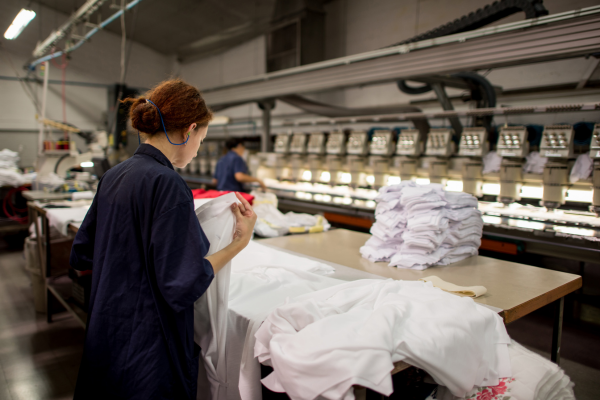Fast Fashion and its Effect on Retail Supply Chain Management

Fast fashion has become a global phenomenon that redefines how clothing is designed and produced. With rapid production cycles, low-cost trends and high consumer demand, this industry disrupts traditional retail models and creates a dynamic, ever-changing market landscape.
Yet, behind the vibrant storefronts and ever-changing collections lies a complex web of challenges and opportunities for retail supply chain management–challenges that demand a balance between efficiency, ethics and environmental stewardship.
Audio produced by Hubspot using AI narration.
What is Fast Fashion?
Fast fashion refers to a business model centered on quick turnaround times and frequent product launches. According to the Oxford Dictionary, fast fashion is defined as “inexpensive clothing produced rapidly by mass-market retailers in response to the latest trends.”
The term began to gain traction in the late 1990s and early 2000s as brands like Zara and H&M revolutionized how fashion trends were translated into retail offerings. These pioneers demonstrated that it was possible to move from design to distribution in just a few weeks, a stark contrast to traditional retail methods that could take months.
Today, fast fashion is embodied by a range of brands. While established names like Zara, H&M and Forever 21 continue to lead the way, emerging retailers like Shein, Boohoo and Pretty Little Thing have expanded the model globally.
Born out of the desire to capture current trends and deliver them to consumers at an affordable price, fast fashion has grown exponentially in the global market. Its key characteristics include:
- accelerated design-to-distribution processes
- trend-driven inventory
- a constant pressure to reduce production time
These retail supply chains are optimized for speed and high inventory turnover, with shorter product life cycles that prioritize affordability over durability, in contrast to slow fashion.
Slow Fashion Defined
Slow fashion and traditional retail supply chains emphasize longer lead times, higher quality production and more sustainable practices. Slow fashion focuses on ethical sourcing, durability and reducing environmental impact, often resulting in more time-intensive and costlier production processes. Fast fashion supply chains, on the other hand, are designed for rapid responsiveness and cost efficiency, which can come at the expense of environmental and ethical considerations.
Impact on Retail Supply Chain Management
The rise of fast fashion forces retailers to develop ultra-responsive supply chains capable of rapid production and distribution. Retailers must carefully balance high stock turnover with the risk of overproduction while striving to maintain sustainable practices. Low-cost production pressures often strain supplier relationships and challenge traditional cost management strategies.
Beyond efficiency, fast fashion brings significant ethical and environmental considerations. The rapid production cycles and constant product refreshes lead to increased waste, elevated carbon emissions and sometimes exploitative labor practices.
Concerns over environmental impact and labor conditions have affected several fast fashion brands. For example, Boohoo has faced significant public scrutiny and regulatory investigations over its labor practices. Reports have highlighted issues including low wages and unsafe working conditions in parts of its supply chain. This controversy underscores the ethical and environmental challenges inherent in fast fashion and has spurred calls for more responsible sourcing and production practices across the industry.
These issues compel companies to rethink their supply chain strategies and consider responsible alternatives that reduce waste, improve resource efficiency and ensure fair labor practices.
Strategic Responses to Fast Fashion Challenges
In response to these challenges, retailers are adopting strategies to enhance supply chain flexibility while reinforcing ethical and environmental standards.
Diversifying suppliers, embracing just-in-time manufacturing and investing in real-time tracking systems are proving essential to remain agile. Technology plays a key role; advanced analytics, AI-driven forecasting and automated systems not only optimize operations but also predict trends with greater accuracy.
Studies like “The Role of Supply Chain Management in Fast Fashion Merchandising” underscore the pivotal role that technology plays in fast fashion supply chains. The research highlights how integrating advanced analytics and real-time monitoring systems not only streamlines inventory management and reduces waste but also enables swift adaptation to rapidly changing consumer demands. This evidence supports the notion that adopting cutting-edge technology is critical to achieving both operational efficiency and sustainability in the fast fashion industry.
Additionally, sustainability is emerging and a non-negotiable priority. Retailers are increasingly integrating eco-friendly practices into their supply chains–from using recycled materials to reducing energy consumption in manufacturing facilities. Collaborative efforts among suppliers, logistics partners and even competitors are fostering shared innovation and promoting responsible business practices.
For example, Cascale (formerly the Sustainable Apparel Coalition) brings together brands like H&M, Nike and others along with their suppliers and logistics partners to create shared sustainability standards. Through initiatives such as the Higg Index, these organizations collaborate on data-driven approaches to improve supply chain transparency and reduce environmental impact, ultimately driving responsible business practices across the industry.
These strategic responses illustrate a shift toward doing business for good--where operational efficiency is balanced with ethical and green initiatives.
Preparing Leaders for a Dynamic Retail Supply Chain Landscape
Navigating the complexities of fast fashion supply chains requires both operational efficiency and strategic innovation. Specialized education is key to developing the expertise needed to lead in this environment.
The University of San Diego’s Master’s in Supply Chain Management program is built on the values of transparency, responsibility and a business for good mindset. The curriculum is designed not only to develop technical skills but also to integrate ethics directly into the classroom. Through real-world case studies and hands-on projects, students learn to balance profitability with social and environmental responsibility.
Our program emphasizes ethical procurement, sustainable sourcing and environmental stewardship as key components of modern supply chain management. For example, students explore practical strategies for ethical decision-making and are encouraged to consider the broader impact of their choices on communities and the environment.
Graduates of the program emerge as experts in advanced analytics and operational efficiency and as champions of ethical and sustainable business practices. They’re well-equipped to lead in a dynamic retail landscape, driving change that benefits organizations, the industry and society as a whole.
Shaping the Future of Retail Supply Chains
Fast fashion has transformed retail supply chains by demanding agility, cost efficiency and ethical responsibility. Retailers who adapt to these changes by embracing technological innovations and sustainable practices will thrive in this evolving landscape. Leaders who blend operational expertise with strategic vision will set the stage for the future of retail.
If you are ready to lead in a fast-changing retail environment, discover careers in SCM, where your leadership can transform challenges into opportunities. Or, explore the Master in Supply Chain Management courses and curriculum that will equip you with the skills to innovate and excel.





